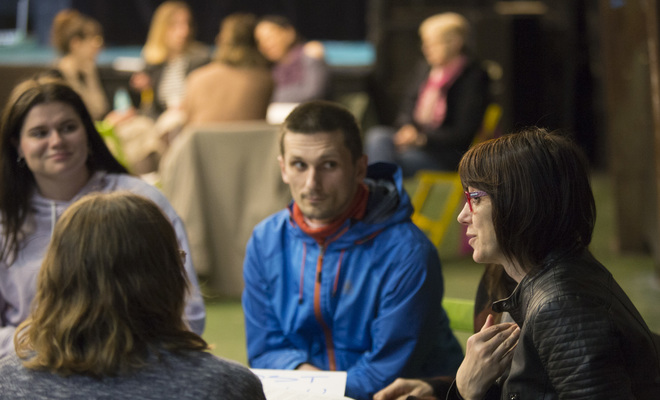Faces of solidarity today

On April 9th 2022, the Centre for Peace Studies organized an interesting interactive activity "Faces of Solidarity Today" in the Močvara club with participants and coordinators of the Peace Studies program and other interested citizens.
The goal was to discuss the manifestations of solidarity in today's world, which is characterized by a perpetual state of crises ranging from health, climate and economic crises to war. The aim was to hear what our "restless citizens" think about the concept of solidarity with a special focus on five topics prepared and led by coordinators from the Peace Studies program and CPS:
- Solidary system - what mechanisms make it solidary? (Sandra Kasunić)
- Solidarity in the education system (Lovorka Bačić)
- Civic solidarity in recent examples (Banija, Ukraine) (Lana Jurman)
- Solidarity and migration (Maddalena Avon)
- Solidarity and/or humanitarian work. When is the time for one, when for the other? (Goran Božičević)
The World Cafe method was used, which enabled the active contribution of participants to various topics, as well as the exchange of opinions in diverse groups. The meeting "Faces of solidarity today" is part of the international project valUE - Solidarity Matters, which is coordinated by the SOLIDAR network - similar discussions and activities (called Solidarity Labs) are organized in 9 partner countries, giving a specific insight into the state of solidarity among citizens of the European Union from, for example, high school students in Estonia, through mixed groups like the one in Zagreb to women's groups in rural areas of Romania. The process was recorded with a couple of detailed interviews with participants and will be edited into a short documentary that will complement films from partner countries. Also, some of the definitions that were created as conclusions of group talks in Močvara will be part of the so-called SoliDictionairy to which all partners will contribute.
Below read the conclusions constructed by our participants within the aforementioned topics.
The solidary socio-political system is defined as a fair redistribution of funds: accessible and publicly funded public services such as education, health, social care and intergenerational solidarity – provided pensions. Solidarity of the system is also manifested in solidarity with marginalized groups and minorities who need to be ensured equality in rights and access to resources. The key mechanisms of solidarity systems are reflected in tax policies and at the legal level - laws.
Solidarity in the Education System can be seen on different levels and in different forms. In the system itself through scholarships, co-financing and subsidies of student meals, dorms and transportation that contributes to equal access to education. It is also seen through the work of teacher unions and in solidarity actions supporting teachers and their strikes. The solidarity in school life and programs is shown through school and student solidarity funds aiming at those with less financial opportunities, actions of peer support in learning and exchange of textbooks. Learning about and for solidarity is introduced and implemented through cross-curricular topics (Civic Education, Sustainable Development and Personal and Social Development) as well as school solidarity activities in the community.
Simply put, we describe civic solidarity as subtle bonds tying people together around a shared interest or goal. Motivation for civic solidarity, our solidarity lab showed, varies from a need for individual growth through connecting with different problems and/or people we can relate to or have personal contact with to noticing and then reacting to injustice on a higher level. Solidarity seems to grow more for the underprivileged but only when we make the challenges of these groups visible - education, information and knowledge sharing and media coverage is crucial for us to start noticing and understanding the issues and to get engaged. What keeps civic engagement going is seeing the results of your work and getting feedback but it is crucial especially in times of crises or post-crisis to see also the governments stepping up in their part and backing civic engagement up with serious systemic support. This is why civic solidarity is often more than concrete grassroot actions, it often also needs to have an activist perspective, it has to demand systemic change towards fairer and more resilient societies!
Solidarity in the field of migration is to have a common goal, to advocate and act for the rights of refugees and all people seeking security. These days it is often criminalized so it is also the practice towards activists who fight for human rights and experience daily pressure from the institution. Solidarity is not and should never be selective. It is a reaction to injustice that stems from a deep sense of belonging to the community and a desire to build a space where every human life is worth equally.
Solidarity and Humanitarian Aid are very similar, but humanitarian aid maintains the relations, does not change it - the one who has (resources, power, knowledge) helps those who have not (strength, shelter, food). This relation is vertical and solidarity is horizontal - our gain is not obvious, even questionable. In wars e.g. helping “our people” seems to be ok, but helping “the others”? Solidarity questions injustice, inequality, discrimination and violence (structural and cultural) – we ask for change of relations, values and attitudes, we build societies of connected people, resilient to divisions and actions that lead to violence.
Thanks to all the participants who contributed to these discussions!
The valUE - Solidarity Matters project is financed from the Europe for Citizens program of the European Union, whose goal is to encourage citizens to participate in democratic processes at the EU level.
Photo: Bojan Mrđenović


















































